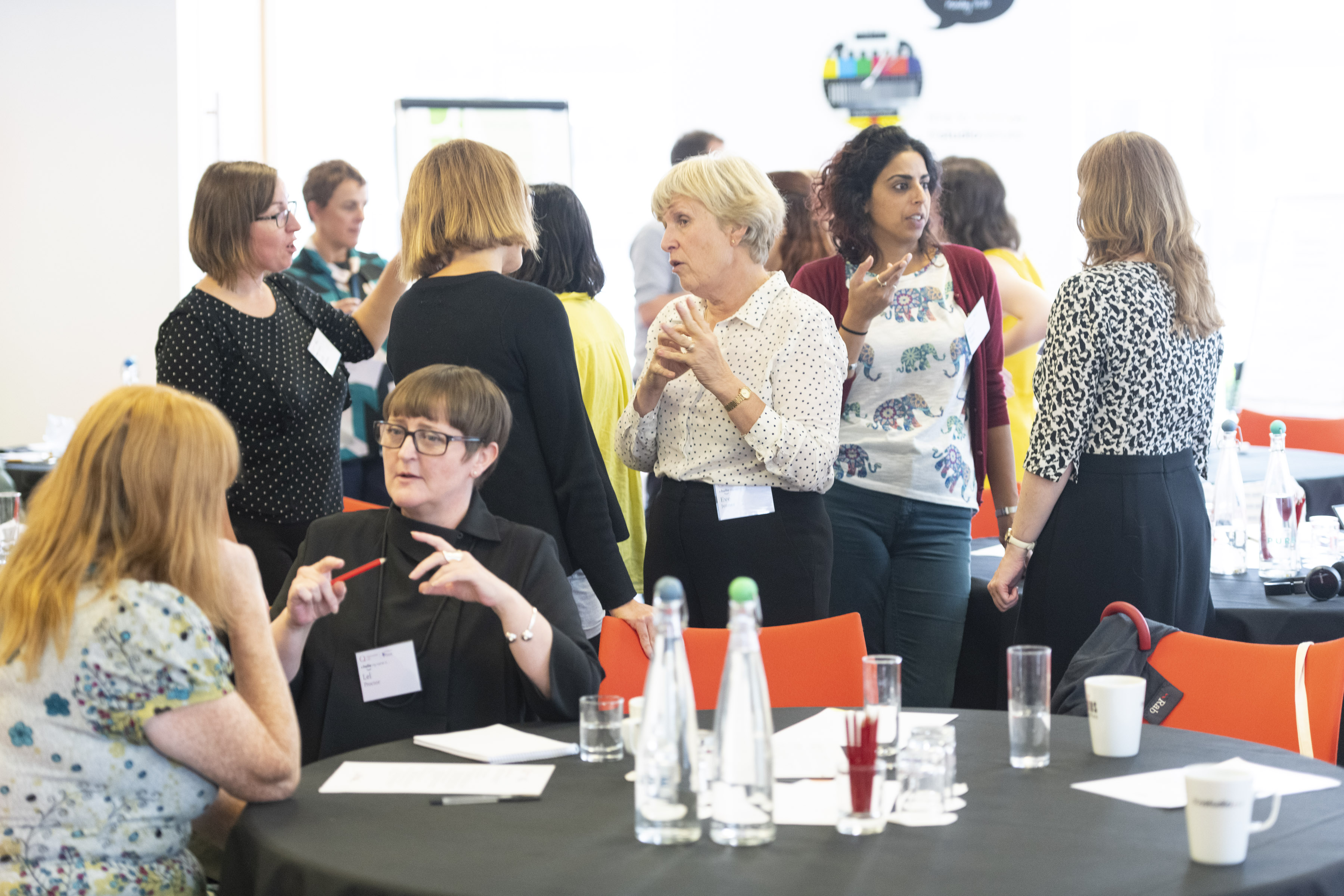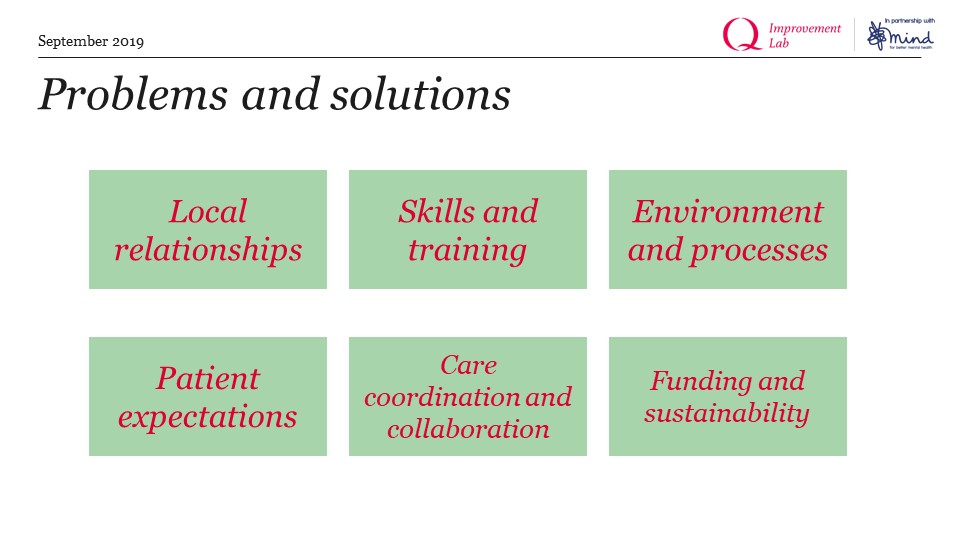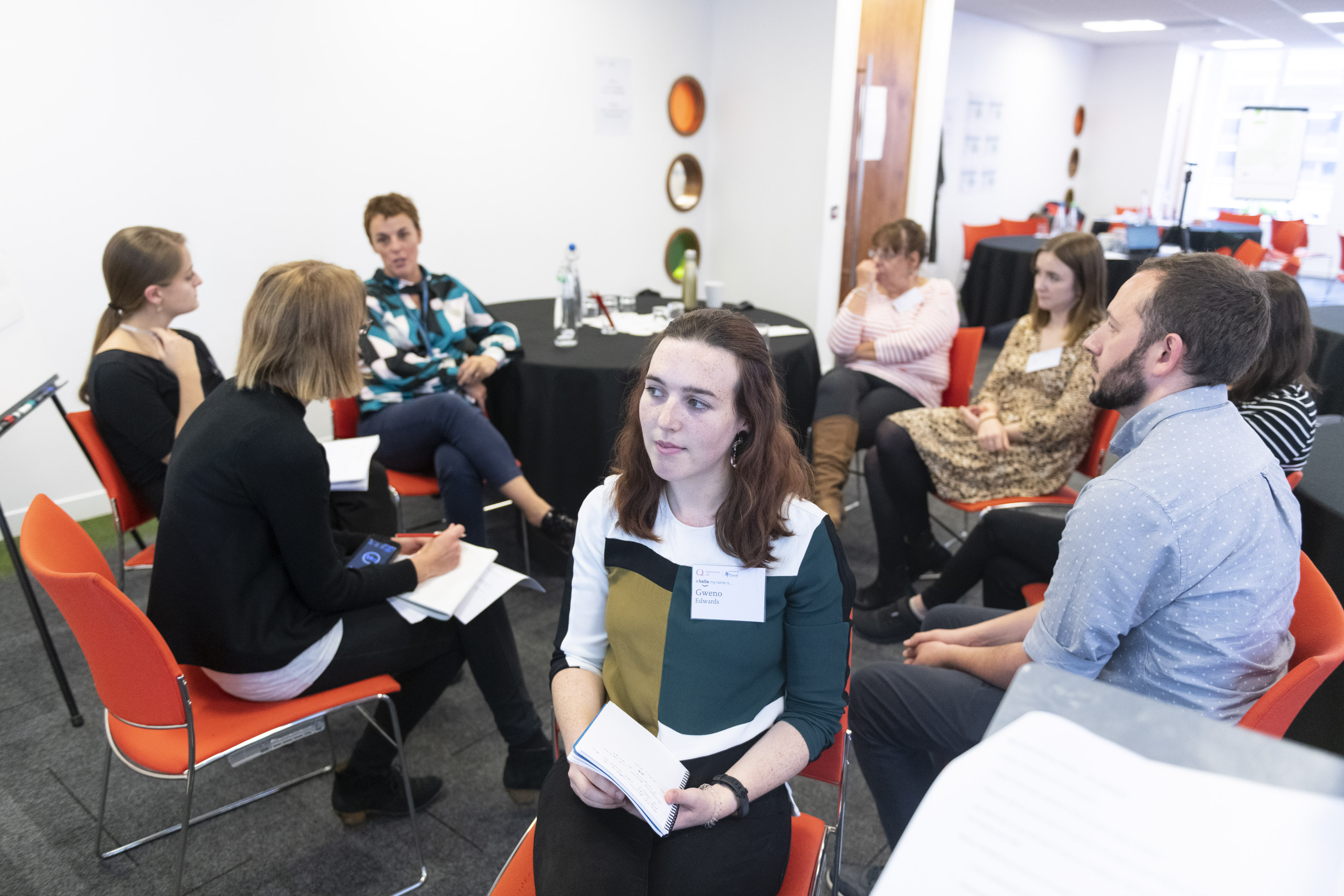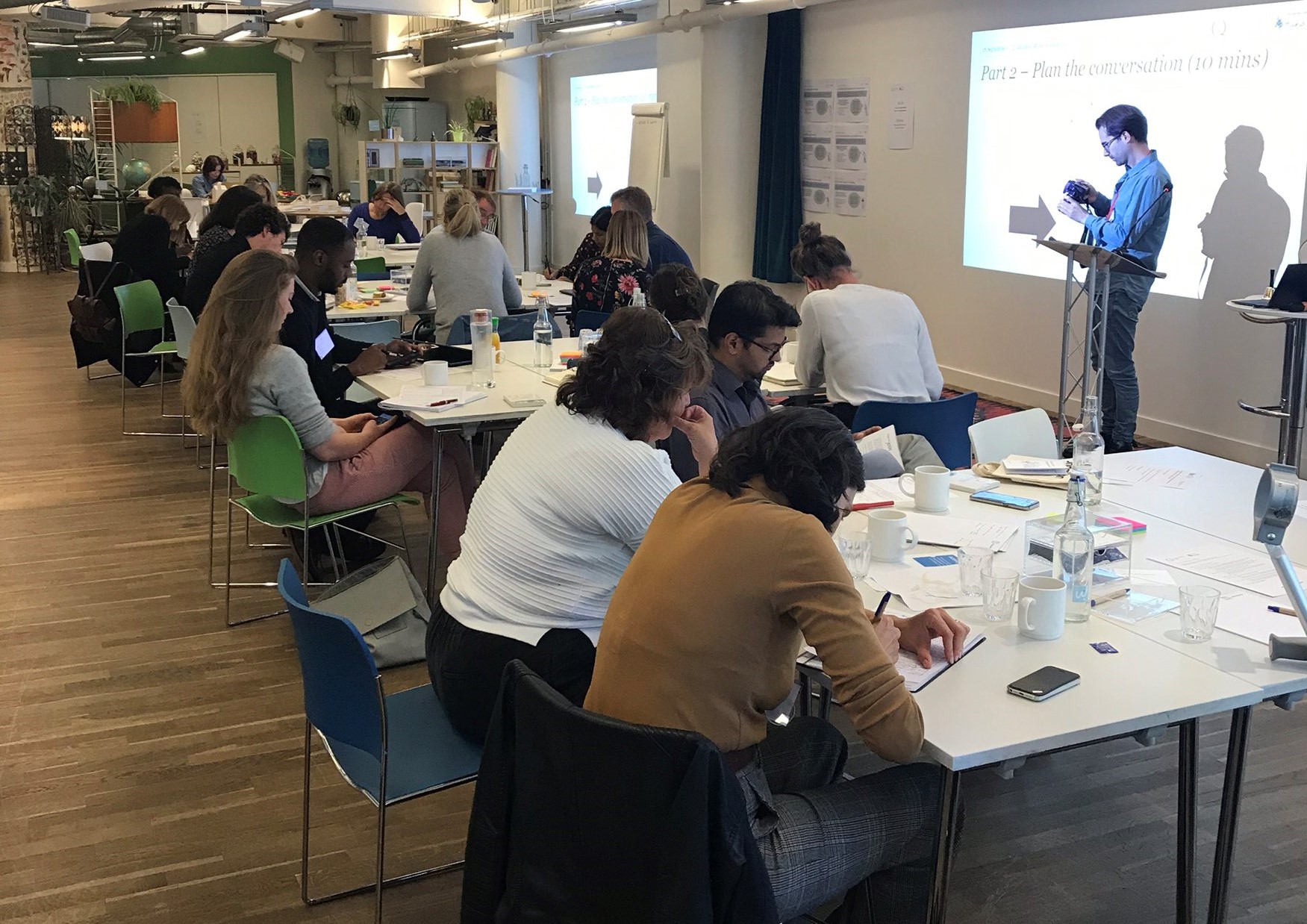It’s hard to believe that it’s been 12 months since the Q Lab and Mind begun work to explore how care can be improved for people living with both mental health problems and persistent back and neck pain. Together we have collaborated with over 120 Lab participants – a diverse group of Q and non-Q members – who have undertaken a range of research activities and, more recently, developing and testing ideas to improve care.
As we near the end of the project, two workshops were held in London and Manchester to bring the learning to life and give Lab participants and Q members the opportunity to think about how it can be applied to the everyday challenges people face when providing or accessing care.
This blog is our attempt to summarise the two creative and collaborative workshops; the learning shared, what we heard from attendees, and the tools and techniques used (that you too might find useful in your own meetings and sessions).
Welcome and icebreaker
Session purpose: Introductions and icebreakers may not be the most important session of the day, but they play a key role in bringing a room together and setting the tone.
Try it yourself: In both the London and Manchester workshops, we had fun getting to know each other with a simple networking activity, where pairs asked each other:
- What did you have for lunch?
- Why is mental health and/or persistent pain important to you?
- What are you most looking forward to during the workshop?

Session 1: Sharing the learning and exploring solutions
Session purpose: Jo (Q Lab Insight Manager) had the not-so-easy task of summarising 12 months worth of learning on mental health and persistent pain, outlining six high level problems and possible solutions. (This learning will be published later this year, but you can also download Jo’s summary from the workshops here.) Attendees then considered how the learning could be applied to their local challenges and contexts.

Try it yourself: For this task we used Troika consulting (a Liberating Structures method) that enables people to receive peer-to-peer coaching from others on a challenge.
Key takeaways:
- Some of the learning about what it takes to improve care across mental health and persistent pain may not be new to people but that doesn’t mean it is easy. Even small changes can make a difference, and there are examples of people and organisations making change happen.
- Troika is a simple yet powerful activity for harnessing different perspectives, to get insightful and innovative feedback on a live problem. The ideas shared ranged from practical examples from other organisations, to more ‘coaching’ advice on how to effectively approach or manage the challenge.

Session 2: Testing new ideas: what did we learn?
Session purpose: Five teams from across the UK have been developing and testing ideas to improve care. In this session we heard their honest reflections about their testing journey; the interventions they have developed and tested to improve care, and key learning from the projects.
Key takeaways: The test teams have each had diverse journeys and learning experiences that are difficult to do justice to in this blog. Here are a few highlights from what the teams shared in the presentations and discussions:
- Health Innovation Network and Sydenham Gardens discussed the challenges of gathering the right evidence on how and if a new intervention is working, and how to make the case for long-term funding.
- Health Innovation Network and St George’s and Kingston Hospital shared how important physio focus groups have been in their project to improve training, and the valuable feedback and insights the groups have produced to help develop the programme.
Great to hear from the test team @HINSouthLondon & @KingstonHospNHS on developing training to support physios on:
👍how to start and manage conversations related to #mentalhealth & wellbeing and
↔️ where to signpost / refer if a need is identified#QLabs @MindCharity pic.twitter.com/XE1u2ZJvgE— The Q Community (@theQCommunity) September 18, 2019
- Powys Health Teaching Board reflected on how beneficial they’ve found it to use methods from design in their project, which has given them new ideas for how to involve and understand the needs of users, and helped develop new skills in the team that they can take forward.
- Keele University and Midlands Partnership NHS Foundation Trust reflected on how the Lab approach supported them to improve engagement at their organisation and improve how they work with people with lived experience in forming a community of practice.
Next up is Tom from @KeeleIAU & @mpftnhs, sharing learnings from the #CommunityOfPractice they established, harnessing the insight of people from all perspectives of persistent pain and #MentalHealth, from professional expertise to lived experience.#QLabs pic.twitter.com/nlN3xLSOkt
— The Q Community (@theQCommunity) September 27, 2019
- Robert Jones and Agnes Hunt Orthopaedic Hospital shared learning for how they manage engagement, particularly from clinicians when time is a barrier. They looked at ways around this – including utilising lunchtimes for more informal feedback and identifying work that could be led by non-clinical staff.
Read more here on each of the test teams and their projects.
Session 3: The importance of influencing in your system
“Ultimately, I’ve never seen a project that gets scaled up other than when people feel passionately that they can make it happen […] Find local champions who will drive it forward. Make it a local priority by doing it and showing the outcomes. People will do it when it makes sense for them to do it.”
Session purpose: Attendees had the opportunity to practice (and get feedback on) their influencing skills, recognising that change and improvements to health and care often require some level of influencing. The main activity in this session was a short ‘role play’ – two words that may fill some people with dread but attendees were assured that they would get valuable feedback and learning from it.
Try it yourself: In groups of three, people took it in turns to present to the other two in their group – imagining they were the people they are trying to influence. Those listening were asked to structure their feedback to the person by completing these three short sentences:
- One thing that influenced me …
- One thing that caused me to doubt …
- The impact of your voice and body language …
The presenter then listened to the feedback, thanked those listening and went again, incorporating the responses they’d heard.

This activity was adapted from ‘Speaking up, Listening up’, a course led by Ben Fuchs, John Higgins at the NHS Leadership Academy.
If you’re interested in further reading, these resources were suggested by an attendee:
- Speak up – Megan Reitz and John Higgins
- Beyond the Toolkit – Leading Quality Improvement in Health and Social Care
- Hope Behind the Headlines: Shifting Culture in Health and Social Care
Key takeaway: To make change happen, influencing is a key part of the process. While it can mean different things to different people, it’s an important skill to practice and develop. One attendee commented “I’d always thought about influencing as something that is done at policy-level, but recently I’ve started realising that it is much broader than that” – [it’s something we all do, and have the ability to do with our managers, peers, other people we work with] and another “Organisations change one conversation at a time’ and we are influencing people all the time.”
‘organisations make change happen, one conversation at a time’. Powerful reflection shared by a @HealthFdn #GenQ fellow. We have a lot more power to influence and make change then we may realise #Qlabs
— Daphne (@d_amevenu) September 18, 2019
Session 4: Networking and taking action
Session purpose: Time to reflect on what attendees had heard and taken away from conversations, and what they are going to do next to take work forward in their own organisations.
Attendees completed a short commitment card, with some questions to prompt thoughts, and discuss reflections. The commitment cards also doubled as postcards – so we’ll be posting these back to attendees in a few weeks’ time as a reminder of their actions!
To round off the day, we’re asking all participants to draw on the conversations from today’s #QLabs workshop and commit to an action they will carry out back in their organisation✍️ pic.twitter.com/QB0EeiTElW
— The Q Community (@theQCommunity) September 27, 2019
Try it yourself: Feel free to download and use the Q Lab template for your next meeting or workshop.
Download Q Lab Postcard (A5)
Next steps
The Q Lab will be publishing an interactive guide on practical ideas to improve care for people living with both mental health problems and persistent back and neck pain.
The guide will also feature a set of service principles that describe what matters to people with lived experience of mental health and persistent pain about the care they receive.
‘Mental health and persistent pain may sound like a niche topic, but the impact is enormous’@libbykeckhealth kicks off final session of todays #QLabs workshop, focusing on action and next steps for @Mindcharity, Lab participants & #Qcommunity
— The Q Community (@theQCommunity) September 18, 2019
If you’re registered to attend the UK-wide Q Community Event on 13 November in London, join us at our break out session ‘Improving care, collaboratively and creatively, across mental and physical health’ to hear more about the Lab, the test teams and try some new methods.
Mind will also be continuing this work through their current partnerships, including their work with the Richmond Group, Equally Well UK and the We Are Undefeatable campaign.
Finally, a huge thank you to those who joined us in London and Manchester for two great events – and all the Lab participants who have collaborated with us so far to make progress on this work.

Stay updated with the work and connect with others by joining the online group.